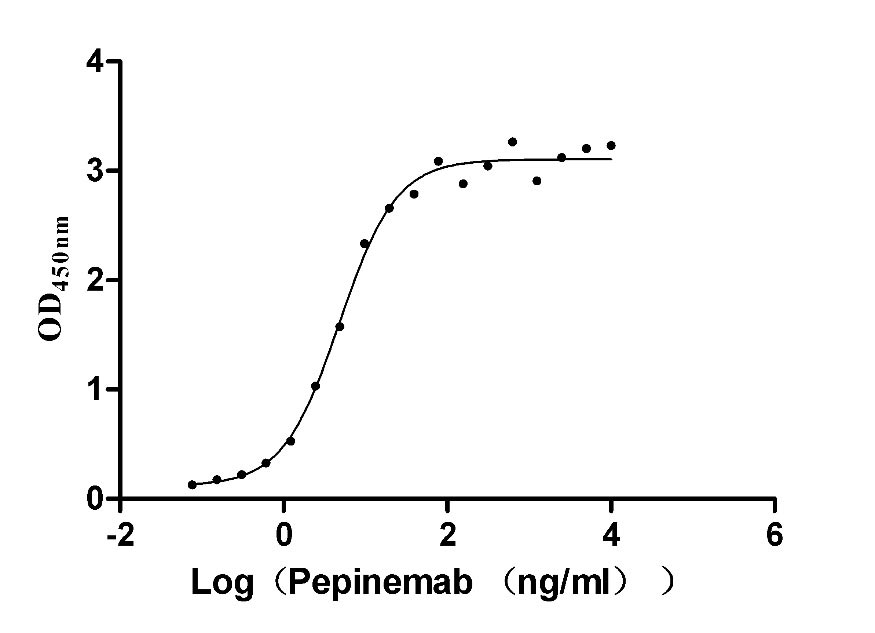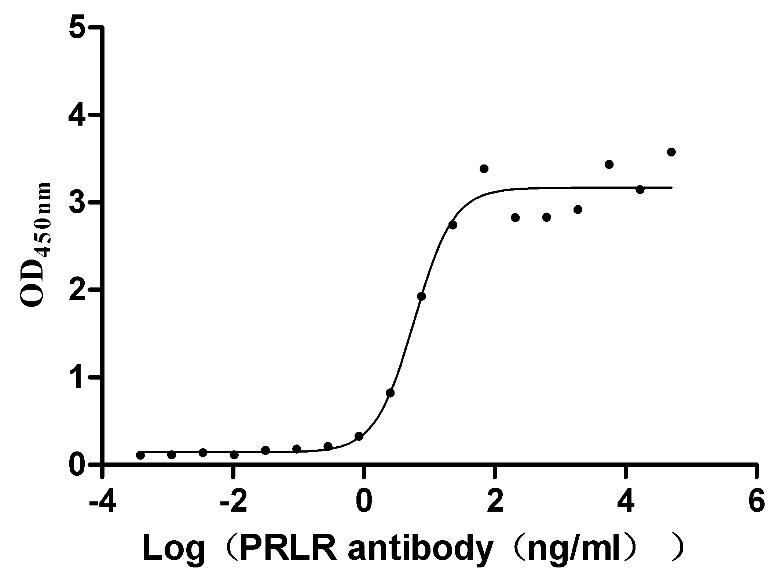Recombinant Human Transmembrane protease serine 2 (TMPRSS2), partial
Unavailable-
中文名稱:人TMPRSS2重組蛋白
-
貨號:CSB-EP023924HU1a2
-
規(guī)格:
-
其他:
產(chǎn)品詳情
-
純度:Greater than 85% as determined by SDS-PAGE.
-
基因名:
-
Uniprot No.:
-
別名:TMPRSS2; PRSS10; Transmembrane protease serine 2; Serine protease 10
-
種屬:Homo sapiens (Human)
-
蛋白長度:Partial
-
來源:E.coli
-
表達(dá)區(qū)域:256-492 aa
-
氨基酸序列IVGGESALPGAWPWQVSLHVQNVHVCGGSIITPEWIVTAAHCVEKPLNNPWHWTAFAGILRQSFMFYGAGYQVEKVISHPNYDSKTKNNDIALMKLQKPLTFNDLVKPVCLPNPGMMLQPEQLCWISGWGATEEKGKTSEVLNAAKVLLIETQRCNSRYVYDNLITPAMICAGFLQGNVDSCQGDSGGPLVTSKNNIWWLIGDTSWGSGCAKAYRPGVYGNVMVFTDWIYRQMRADG
Note: The complete sequence including tag sequence, target protein sequence and linker sequence could be provided upon request. -
蛋白標(biāo)簽:N-terminal 6xHis-SUMO-tagged
-
產(chǎn)品提供形式:Liquid or Lyophilized powder
Note: We will preferentially ship the format that we have in stock, however, if you have any special requirement for the format, please remark your requirement when placing the order, we will prepare according to your demand. -
緩沖液:If the delivery form is liquid, the default storage buffer is Tris/PBS-based buffer, 5%-50% glycerol.
Note: If you have any special requirement for the glycerol content, please remark when you place the order.
If the delivery form is lyophilized powder, the buffer before lyophilization is Tris/PBS-based buffer, 6% Trehalose. -
復(fù)溶:We recommend that this vial be briefly centrifuged prior to opening to bring the contents to the bottom. Please reconstitute protein in deionized sterile water to a concentration of 0.1-1.0 mg/mL.We recommend to add 5-50% of glycerol (final concentration) and aliquot for long-term storage at -20°C/-80°C. Our default final concentration of glycerol is 50%. Customers could use it as reference.
-
儲(chǔ)存條件:Store at -20°C/-80°C upon receipt, aliquoting is necessary for mutiple use. Avoid repeated freeze-thaw cycles.
-
保質(zhì)期:The shelf life is related to many factors, storage state, buffer ingredients, storage temperature and the stability of the protein itself.
Generally, the shelf life of liquid form is 6 months at -20°C/-80°C. The shelf life of lyophilized form is 12 months at -20°C/-80°C. -
貨期:Delivery time may differ from different purchasing way or location, please kindly consult your local distributors for specific delivery time.
-
注意事項(xiàng):Repeated freezing and thawing is not recommended. Store working aliquots at 4°C for up to one week.
-
Datasheet & COA:Please contact us to get it.
相關(guān)產(chǎn)品
靶點(diǎn)詳情
-
功能:Plasma membrane-anchored serine protease that participates in proteolytic cascades of relevance for the normal physiologic function of the prostate. Androgen-induced TMPRSS2 activates several substrates that include pro-hepatocyte growth factor/HGF, the protease activated receptor-2/F2RL1 or matriptase/ST14 leading to extracellular matrix disruption and metastasis of prostate cancer cells. In addition, activates trigeminal neurons and contribute to both spontaneous pain and mechanical allodynia.; (Microbial infection) Facilitates human coronaviruses SARS-CoV and SARS-CoV-2 infections via two independent mechanisms, proteolytic cleavage of ACE2 receptor which promotes viral uptake, and cleavage of coronavirus spike glycoproteins which activates the glycoprotein for host cell entry. Upon SARS-CoV-2 infection, increases syncytia formation by accelerating the fusion process. Proteolytically cleaves and activates the spike glycoproteins of human coronavirus 229E (HCoV-229E) and human coronavirus EMC (HCoV-EMC) and the fusion glycoproteins F0 of Sendai virus (SeV), human metapneumovirus (HMPV), human parainfluenza 1, 2, 3, 4a and 4b viruses (HPIV). Essential for spread and pathogenesis of influenza A virus (strains H1N1, H3N2 and H7N9); involved in proteolytic cleavage and activation of hemagglutinin (HA) protein which is essential for viral infectivity.
-
基因功能參考文獻(xiàn):
- A potential novel function of TMPRSS2-ERG as a major regulator of IGF1R gene expression. PMID: 27285981
- Study shows that T2E fusion transcripts are associated with higher levels of AMACR mRNA in patients with atypical small acinar proliferation (ASAP) which represents an indicator of risk for prostate cancer in patients with ASAP. PMID: 29277318
- TMPRSS2-ERG may have a role in progression of prostate neoplasms and in alteration of the metabolic profile PMID: 27276682
- We propose that epigenetic events are a significant and alternative driver of aggressive disease in TMPRSS2-ERG fusion-negative prostate cancer. PMID: 27814612
- Meta-analysis showed the prevalence of TMPRSS2:ERG fusions in prostate cancer to be highest in men of European descent (49%), followed by Asians (27%) and then African (25%) descent. PMID: 28633309
- Data show that tumors displaying TMPRSS2-ERG fusions that retained interstitial genes were less likely to be associated with biochemical recurrence PMID: 29127096
- We demonstrate a role for inflammation-induced oxidative stress in the formation of DNA breaks leading to recurrent TMPRSS2-ERG gene fusions. The transcriptional status and epigenetic features of the target genes influence this effect. PMID: 27926866
- NOTCH pathway inhibition antagonizes the growth and invasion of transmembrane protease serine 2 (TMPRSS2)-transforming protein ERG (ERG) (T2E) -positive prostate cancer cells. PMID: 28783165
- The TMPRSS2-ERG gene fusion is the most frequently observed genetic aberration in prostate cancer. PMID: 28845585
- Study provide evidence that PTEN deletion and TMPRSS2-ERG gene fusion were mutually exclusive in patients with prostate neoplasm. TMPRSS2-ERG gene fusion was rare compared to peripheral zone tumors and to PTEN inactivation in T1a transition zone tumors. PMID: 27500376
- miR-204 upregulates androgen receptor (AR ) and downregulates TMPRSS2/ERG through direct regulation of their promoter methylation and set of transcription factors during AR cancer-related reprogramming. PMID: 28050800
- differential expression of TMPRSS2:ERG in urine exosomes in prostate cancer and controls PMID: 27144529
- The present study established evidence for the first two common PrCa risk variants differentially associated with TMPRSS2:ERG fusion status. TMPRSS2:ERG phenotyping of larger studies is required to determine comprehensive sets of variants with subtype-specific roles in prostate cancer. PMID: 27798103
- Human coronavirus 229E presumably evolved to bypass the endosome by entering the cell via TMPRSS2. PMID: 27733646
- Studies indicate that TMPRSS2-ERG fusion gene positive prostate cancers cells rewire intracellular signaling cascades and modulate gene and protein network. PMID: 28364793
- TMPRSS2-ERG role in prostate cancer invasiveness and regulation of MMP-9 and plexin B1. PMID: 28004109
- Our results indicate that it is possible to predict pT3 stage at final histology from TMPRSS2:ERG gene fusion at initial core needle biopsy. FISH determination of TMPRSS2:ERG gene fusion may be particularly useful for patients scheduled to undergo a radical prostatectomy in order to improve oncological and functional results PMID: 27377958
- Data show there was a good agreement of transcriptional regulator ERG protein (ERG) immunostaining with the presence of TMPRSS2:ERG fusion protein. PMID: 27320318
- A combination of high preoperative serum PSA and high expression of TMPRSS2-ERG could be promising in distinguishing those tumors that are aggressive and life-threatening. PMID: 27630329
- Studies showed that urinary TMPRSS2:ERG transcripts seem to be indicative of Prostate cancer aggressiveness upon biopsy. [review] PMID: 26774207
- Aspirin was associated with a significant reduction in the relative risk of TMPRSS2:ERG (T2E )fusion positive, but not T2E negative PMID: 26503111
- the type II transmembrane serine protease TMPRSS2 was able to activate hemagglutinin for cell entry indicating that bat influenza A virus can utilize human proteases for hemagglutinin activation. PMID: 27028521
- The relatively low rate of ERG-positive prostatic intraepithelial neoplasia counts in favor of the limited role of chimeric transcript TMPRSS2/ERG in the differential diagnosis of prostatic intraepithelial neoplasia PMID: 26978019
- TMPRSS2 isoform 1 is expressed in viral target cells. PMID: 26379044
- The TMPRSS2-ERG Gene Fusion Blocks XRCC4-Mediated Nonhomologous End-Joining Repair and Radiosensitizes Prostate Cancer Cells to PARP Inhibition PMID: 26026052
- The potential for TMPRSS2:ERG gene fusion, detected by IHC, to modify the role of PTEN loss in lethal progression of prostate cancer. PMID: 26615022
- Results indicate that PTEN loss occurs in cooperation with TMPRSS2-ERG fusion in prostate cancer and the majority of the samples harbor TMPRSS2-ERG fusion as well as PTEN gene deletion. PMID: 26424596
- Elucidation of ERG regulation of ABEs in castration-resistant prostate cancer (CRPC) may help to stratify TMPRSS2-ERG fusion-positive prostate cancer patients in the clinic for anti-androgen receptor-driven therapies. PMID: 25754347
- these data show that the androgen-driven events causing TMPRSS2-ERG fusions and other rearrangements of androgen-dependent genes in prostate epithelial cells of young patients preferentially lead to low-grade (and not high-grade) prostate cancer. PMID: 25015038
- TMPRSS2-ERG fusion gene transcript was found in 63, 55 and 73% of the prostate cancer cases on urine alone, biopsy rinse material alone and paired samples, respectively. PMID: 24997128
- Genetic inhibition of TMPRSS2-ERG junction oncogene in prostate cancer by means of siRNA has strong antineoplastic effect in a mouse model and in vitro. PMID: 25933120
- Data showed that TMPRSS2 expression is not only dramatically increased in the primary cancers of patients but TMPRSS2 immunopositivity is also directly correlated with cancer pain severity in these patients. PMID: 25734995
- High AR gene copy number emerges during the development of Small cell carcinoma of the prostate, often in association with TMPRSS2-ERG rearrangement. PMID: 24777847
- Both IHC and qRT-PCR are useful tools in detecting TMPRSS2:ERG fusions. PMID: 25007891
- Membrane bound meprin Beta is activated by transmembrane serine protease matriptase-2 at the cell surface. PMID: 26251449
- Data indicate that inhibition of transcriptional regulator ERG protein expression in transmembrane protease serine 2 protein (TMPRSS2):ERG-positive prostate cancer cells increased neuroendocrine cell gene expression. PMID: 25263440
- TMPRSS2 promotes the growth, invasion, and metastasis of prostate cancer cells via matriptase activation and extracellular matrix disruption. PMID: 26018085
- Analysis of prostate cancer tissues showed that the presence of a TMPRSS2-ERG rearrangement was highly correlated with lower levels of NKX3.1 expression consistent with the role of NKX3.1 as a suppressor of the pathogenic gene rearrangement. PMID: 25977336
- The TMPRSS2 Met160Val polymorphism is a genetic risk factor for sporadic prostate cancer in a Japanese population. PMID: 25040002
- The expression levels of the TMPRSS2-ERG fusion is related to a more aggressive phenotype, have an effect on prognosis and could be molecular markers of progression for prostate cancer. PMID: 25939480
- Results provide suggestive evidence that men with TMPRSS2:ERG positive tumors may have longer prostate cancer survival after ADT. PMID: 25728532
- recent and maximum BMI are inversely associated with the odds of developing T2E-positive prostate cancer, but no associations were observed for T2E-negative prostate canc PMID: 25852077
- TMPRSS2-ERG gene fusions induce prostate tumorigenesis by modulating microRNA miR-200c. PMID: 24186205
- activates hepatitis C virus infection at the postbinding and entry stage PMID: 25203900
- results demonstrate the ability of confocal microscopy and FISH to identify the cell-to-cell differences in common gene fusions such as TMPRSS2-ERG that may arise independently within the same tumor focus PMID: 25175909
- The effect of TMPRSS2/ERG gene fusions had differing effects on radiosensitivity and chemosensitivity depending on cell line and fusion type. PMID: 21394739
- These findings indicate that TMPRSS2-ERG may or may not lead to prostate cancer development PMID: 24961351
- Report prognostic value of tissue/urinary TMPRSS2-ERG levels in prostate neoplasms. PMID: 24072184
- concurrent in situ detection of gene expression, point mutations, and gene fusions of the prostate cancer relevant targets TMPRSS2-ERG PMID: 24931216
- TMPRSS2:ERG gene fusion synergizes with the VDR to induce CYP24A1 expression-limiting VDR signaling. PMID: 24926821
顯示更多
收起更多
-
亞細(xì)胞定位:Cell membrane; Single-pass type II membrane protein.; [Transmembrane protease serine 2 catalytic chain]: Secreted.
-
蛋白家族:Peptidase S1 family
-
組織特異性:Expressed in several tissues that comprise large populations of epithelial cells with the highest level of transcripts measured in the prostate gland. Expressed in type II pneumocytes in the lung (at protein level). Expressed strongly in small intestine.
-
數(shù)據(jù)庫鏈接:
Most popular with customers
-
Recombinant Human Pro-neuregulin-1, membrane-bound isoform (NRG1), partial (Active)
Express system: Mammalian cell
Species: Homo sapiens (Human)
-
Recombinant Human Semaphorin-4D (SEMA4D), partial (Active)
Express system: Mammalian cell
Species: Homo sapiens (Human)
-
Recombinant Mouse Prolactin receptor (Prlr), partial (Active)
Express system: Mammalian cell
Species: Mus musculus (Mouse)
-
Recombinant Human Complement component C1q receptor (CD93), partial (Active)
Express system: Mammalian cell
Species: Homo sapiens (Human)
-
Recombinant Mouse CUB domain-containing protein 1 (Cdcp1), partial (Active)
Express system: Mammalian cell
Species: Mus musculus (Mouse)
-
Recombinant Macaca fascicularis CUB domain containing protein 1 (CDCP1), partial (Active)
Express system: Mammalian cell
Species: Macaca fascicularis (Crab-eating macaque) (Cynomolgus monkey)
-
Recombinant Human Carcinoembryonic antigen-related cell adhesion molecule 8(CEACAM8) (Active)
Express system: Mammalian cell
Species: Homo sapiens (Human)


-AC1.jpg)
















